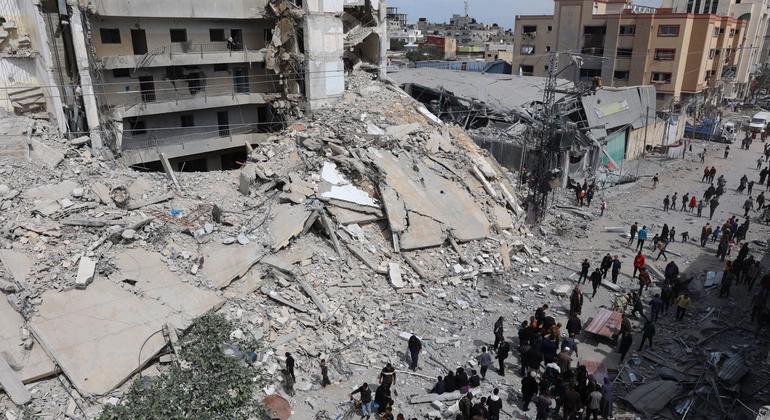challenge in Gaza, with an estimated 72 per cent of the population needing some form of humanitarian assistance. The World Food Programme (WFP) has been providing food assistance to more than 930,000 people in Gaza, including emergency food rations and electronic vouchers for families to buy food in local shops. However, the situation remains dire, with families struggling to put food on the table. The WFP has warned that if the economic situation in Gaza does not improve, more people will become food insecure, leading to a further deterioration of the humanitarian situation. The WFP is also working to support local food production in Gaza, including through the provision of seeds and agricultural inputs to farmers. This is seen as a crucial step towards achieving food security in the enclave. What next? The WFP is planning to continue its food assistance operations in Gaza for the foreseeable future, as the population is expected to need humanitarian aid for many years to come. In addition to providing emergency food assistance, the agency is also working to promote food security and nutrition in Gaza through various programmes and initiatives. The WFP is calling for increased funding to support its operations in Gaza, as the needs of the population remain high and resources are limited. Without sufficient funding, the agency warns that it may not be able to reach all those in need of food assistance.
Mental health support is crucial in a post-conflict Gaza.
Mental health and psychosocial support The conflict in Gaza has taken a heavy toll on the mental health of the population, with many people experiencing trauma, anxiety, and depression as a result of the violence and destruction. The World Health Organization (WHO) has been working to provide mental health and psychosocial support to those affected by the conflict, including through the provision of counselling services and mental health awareness campaigns. The WHO has also been training health workers in Gaza to provide mental health support to their communities, with a focus on identifying and treating common mental health conditions such as depression and anxiety. However, the need for mental health support in Gaza far exceeds the available resources, and more needs to be done to address the mental health crisis in the enclave. What next? The WHO is calling for increased funding to support mental health and psychosocial support programmes in Gaza, as the needs are expected to remain high in the aftermath of the conflict. The agency is also working to build the capacity of local health systems to provide mental health services, including through the training of more health workers in mental health care. Ensuring access to mental health support for all those in need is crucial to promoting recovery and resilience in Gaza, and the WHO is committed to working with local partners to address the mental health crisis in the enclave.
Access to clean water remains a challenge in Gaza.
Water and sanitation Access to clean water and sanitation has been a longstanding challenge in Gaza, with the conflict exacerbating the situation. The lack of access to clean water and proper sanitation facilities poses a significant health risk to the population, with the potential for the spread of waterborne diseases. The United Nations Children’s Fund (UNICEF) has been working to provide clean water and sanitation services to those in need in Gaza, including through the provision of water trucking services, the rehabilitation of water networks, and the construction of latrines. UNICEF has also been working to promote hygiene awareness in Gaza, including through the distribution of hygiene kits and the implementation of hygiene promotion activities. However, much more needs to be done to address the water and sanitation crisis in the enclave. What next? UNICEF is calling for increased funding to support its water and sanitation programmes in Gaza, as the needs of the population remain high and resources are limited. The agency is also working to build the capacity of local water authorities to provide sustainable water and sanitation services to the population, including through the training of water technicians and engineers. Ensuring access to clean water and proper sanitation facilities is essential to protecting the health and well-being of the population in Gaza, and UNICEF is committed to working with local partners to address the water and sanitation crisis in the enclave.









